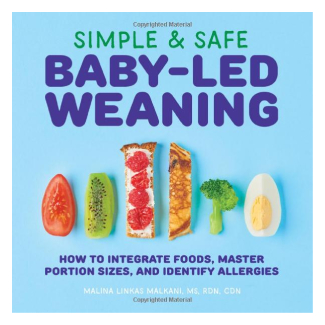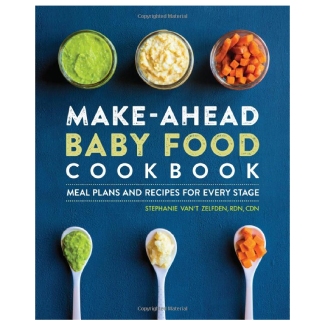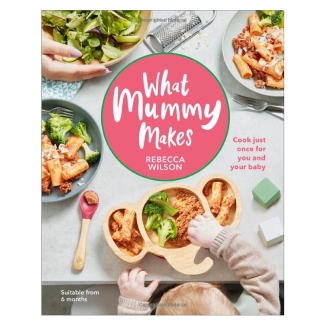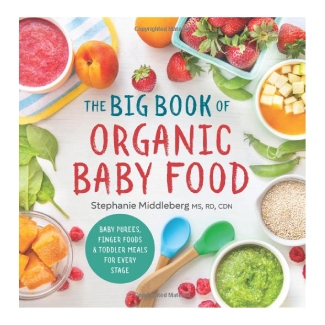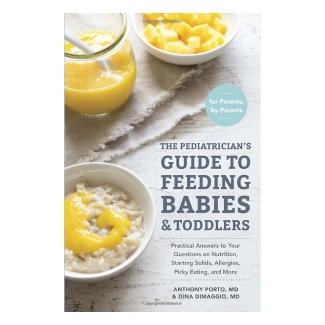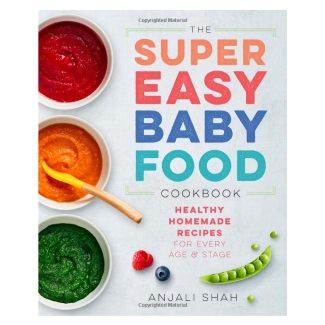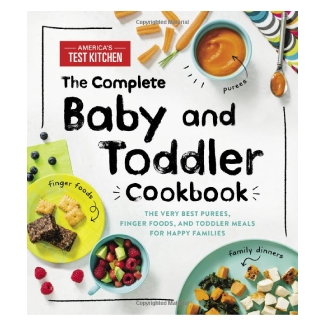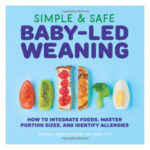Introducing solids is an exciting milestone for your little one, especially as they experience the delightful tastes and textures of their first foods. While some parents prefer to start with simple purees, others choose the baby-led weaning approach. No matter the technique, there are plenty of books that provide insight, guidance, and healthy recipes to get you started. So, snap on that bib and grab a spoon! Here are the seven best baby food books.
7 Best Baby Food Books – Healthy & Delicious Cookbooks (2026 Reviews)
Best Baby Food Cookbooks
-
1. Simple & Safe Baby-Led Weaning by Malina Malkani
(Best for first-time parents — $)
Why it’s great: This book introduces readers to the concept of baby-led weaning, which encourages parents to let their little one lead the way through starting solids. This book offers a basic overview on how to get started, as well as a discussion on safe practices and healthy food options. Readers will also find a chapter on how to identify and prevent allergies and food sensitives early on.
Keep in mind: This book doesn’t have a lot of recipes, but rather guidance and insight on how to begin baby-led weaning.
Good for: Parents just starting solids with their little one as this is a great beginner’s manual.
![Simple & Safe Baby-Led Weaning by Malina Malkani]()
-
2. Make-Ahead Baby Food Cookbook: Meal Plans & Recipes for Every Stage by Stephanie Van’t Zelfden
(Most practical — $$)
Why it’s great: This cookbook is practical and useful and takes the guesswork out of baby’s first mealtimes. Packed with useful advice on how to introduce solids, detect food sensitivities, and discourage picky eaters, this book also includes recipes, meal plans, and grocery lists. Designed to simplify parents’ lives, this book also provides guidance on batch cooking and freezing and reheating food for your baby.
Keep in mind: This book follows a staged approach to introducing solids, starting with purees.
Good for: Parents who like to plan as this book provides meal plans and recipes for cooking in advance.
![Make-Ahead Baby Food Cookbook: Meal Plans & Recipes for Every Stage by Stephanie Van’t Zelfden]()
-
3. What Mummy Makes: Cook Just Once for You and Your Baby by Rebecca Wilson
(Highest-rated recipes — $$$)
Why it’s great: One of the highest-rated baby cookbooks on Amazon, this book offers over 130 recipes for the whole family. Based on the logic that parents shouldn’t have to cook more than one meal for their family, this book is packed with quick, easy recipes that can be adapted for children as young as six months old. Parents praise this cookbook for featuring recipes that are easy to follow and delicious to eat.
Keep in mind: This book follows the baby-led weaning approach to starting solids.
Good for: Parents looking for some kitchen inspiration, not just for baby’s meals but theirs too!
![What Mummy Makes: Cook Just Once for You and Your Baby by Rebecca Wilson]()
-
4. The Big Book of Organic Baby Food by Stephanie Middleberg
(Most comprehensive — $$)
Why it’s great: Featuring over 200 kid-friendly recipes, this book focuses on organic and whole-food ingredients. Divided into chapters based on children’s ages and stages, this book covers all the developmental phases from infancy to toddlerhood and provides FAQs to guide your meal plans accordingly. Recipes include purees, smoothies, finger foods, and beyond, with over 70 recipes for the whole family to enjoy together.
Keep in mind: Some customers report that the puree recipes can feel a little repetitive.
Good for: Parents who want to explore different approaches and recipes when introducing solids as this book covers it all.
![The Big Book of Organic Baby Food by Stephanie Middleberg]()
-
5. The Pediatrician’s Guide to Feeding Babies and Toddlers by Anthony Porto M.D. and Dina DiMaggio M.D.
(Most informational — $$$)
Why it’s great: Written for first-time parents, this book is an all-inclusive manual that offers clarity, guidance, and peace of mind on feeding your infant solids for the first time. Written by two pediatricians, this book offers practical advice on nutrition, medical conditions, and parental concerns. Accessible and informative, this book also includes personal anecdotes and healthy recipes.
Keep in mind: This book doesn’t include as many recipes as other baby food books available.
Good for: Parents who have lots of questions about starting solids as this book provides up-to-date answers from a team of pediatricians.
![The Pediatrician’s Guide to Feeding Babies and Toddlers by Anthony Porto M.D. and Dina DiMaggio M.D.]()
On An Important Side Note… Asher and I (pictured) feel it’s necessary to highlight the value of life insurance for parents with young kids. After extensive research, we discovered that parents can get insured for as little as $10 per month. We use Ladder Life who offers coverage up to $3M per parent (without a medical exam, just a few health questions) and you can apply 100% online.
Get a quote in less than 30 seconds at LadderLife.com ➜
-
6. Super Easy Baby Food Cookbook by Anjali Shah
(Easiest recipes — $)
Why it’s great: This book offers over 150 recipes that are simple and nutritious and can be made in thirty minutes or less. Recipes include make-ahead purees, five-ingredient toddler recipes, and sample menus designed to fulfill the nutritional requirements for children ages four to eighteen months. Parents praise this cookbook for being well-organized and easy to follow.
Keep in mind: This book doesn’t feature as many pictures of the recipes included.
Good for: Parents who don’t have a lot of time to prepare complicated meals for their little eaters.
![Super Easy Baby Food Cookbook by Anjali Shah]()
-
7. The Complete Baby and Toddler Cookbook by America’s Test Kitchen Kids
(Best for the whole family — $$$)
Why it’s great: A baby and toddler cookbook from the popular series, America’s Test Kitchen Kids, this book offers countless recipes that have been tested and approved by kids, themselves. Recipes include purees, smoothies, finger foods, and family meals to share together. This book also includes recipes kids can help prepare as well as school lunch ideas for preschool and beyond. Chock full of pictures and easy-to-follow instructions, this book is praised for appealing to even the pickiest of eaters.
Keep in mind: This book offers less guidance on starting solids but does include recipes for babies.
Good for: Parents who need a cookbook to keep the whole family happy as this book features recipes for all ages.
![The Complete Baby and Toddler Cookbook by America’s Test Kitchen Kids]()
Simple & Safe Baby-Led Weaning by Malina Malkani
FAQs about Baby Food Books
-
1. What age should I introduce solids?
For the first few months of life, babies get all the nutrients they need from breastmilk or formula. Most doctors recommend waiting to introduce solids until your little one is between four and six months old. You’ll know your baby is ready if they are able to hold their head up on their own, sit up with little or no support, and bring objects to their mouth on their own. If you’re not sure whether your little one is developmentally ready for solids, check in with your pediatrician.
-
2. What’s the best way to start my baby on solids?
The American Academy of Pediatrics says there’s no specific type of food that’s best to start with. You’ll want to use some baby-friendly utensils, and you’ll also want to count on things getting a little messy. Start with a very small amount of one ingredient, so as not to trigger your little one’s reflex response. Don’t worry if your baby spits it back out, it may take a few tries before they understand how to swallow what you’re offering. If your little one is extra hesitant, try mixing food with breast milk or formula for an easier transition.
-
3. What are the best foods to start with?
It’s best to start your little one with a single ingredient food, so as not to overwhelm their tastebuds. Fruit and vegetables are a great place to begin, followed by yogurt, pasta, beans, and tofu. Don’t forget to introduce peanut butter and eggs early on, too. The American Academy of Pediatrics recommends starting allergenic foods before a child’s first birthday as this reduces the likelihood that they develop an allergy to that particular food.
-
4. What’s baby-led weaning?
Baby-led weaning is an approach that relies on following your infant’s lead on eating solids. Instead of feeding purees with a spoon, parents are encouraged to give small strips and slices of food. This allows babies to explore tastes and textures as they learn how to feed themselves. Proponents of the practice say that baby-led weaning promotes the development of motor skills and establishes a healthy relationship with food early in life.
-
5. What’s the best way to prevent choking?
The potential for choking is definitely the scariest part of introducing solids. To avoid any unnecessary risk, be sure to supervise your little one very closely during mealtimes. Cut food in appropriately sized pieces, and always make sure your baby is sitting down while they eat. In the beginning, stick to foods that are a little softer so your little one can easily mash them down to swallow.
Conclusion
Introducing solids doesn’t have to be scary or overwhelming. In fact, with the proper tools and guidance, it can be a fun (if messy) adventure for both you and baby. There are a variety of books on the market that feature delicious recipes that are easy-to-follow and quick to make. Some baby food books even include recipes for older kids and adults to make mealtime simpler and more inclusive. Most baby food books offer practical advice and helpful tips on introducing solids, and parents are sure to find a variety of titles that preach the baby-led weaning approach. While there’s no right food or process to start your baby on solids, you’ll definitely want to keep an eye out for potential allergies and choking hazards. Thanks to the wide selection of baby food books available, raising a little foodie has never been easier, and as their appetite grows, your recipe repertoire will too!




